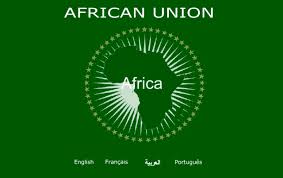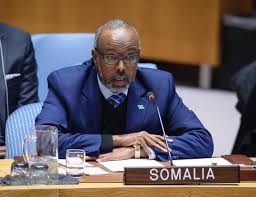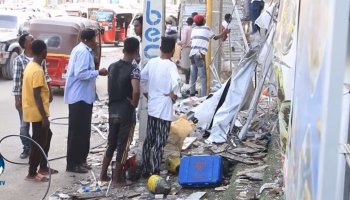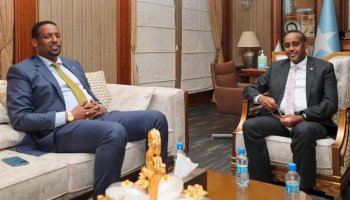Mr President,
Distinguished Ambassadors,
It is an honour for me to be here before you today and to update you on the developments that have occurred in Somalia. This is the first time I have had the opportunity to address the UN Security Council since my appointment as Prime Minister in June. In the intervening period, the humanitarian, security and political landscape has altered and it is my intention to demonstrate the steps that the Transitional Federal Government is taking to address the new challenges and opportunities that face us right now.
Mr. President,
Let me begin by welcoming the report of the Secretary-General on Somalia which is now before the Council and which has noted the positive political and security developments that have occurred in the last three months. A month and half after my appointment as Prime Minister, Al Qaeda affiliated extremist insurgents were forced to withdraw from the capital under pressure from the Somali National Army, with the support of the African Union Mission in Somalia. On August 10, 2011, the Special Representative of the Secretary General, Dr. Augustine Mahiga, updated the Council on the situation in the capital following this withdrawal by al Shabaab, noting that this presented both opportunities and challenges for the Transitional Federal Government as we strive to consolidate security in the city, provide public services to the population, and tackle the enormous humanitarian emergency enveloping our country. We in Somalia recognize, as the Secretary-General’s report states, that failure to do this would fatally undermine the legitimacy and popular support that the government currently enjoys.
My government is doing the best it can within our limited resources to exploit these opportunities. Immediately following the extremists’ withdrawal, a ministerial committee was set up, which visited vacated areas and came up with plans for dealing with the situation. The immediate concern was to re-establish security and fill the vacuum with legitimate state authorities. A state of emergency has been declared in these districts, as well as in IDP camps across the city, in order to prevent crime as well as to deter the return of warlords and militias.
The Cabinet has established two task forces, one with the responsibility to provide armed escort to humanitarian convoys, and the other, a mobile patrol unit, to tackle crime. District Security Committees have been established in all 16 districts of the city and are engaging local communities to determine their priorities and needs. The security forces continue to search for weapons and booby traps in the neighbourhoods formerly occupied by the extremists and, once these have been cleared, citizens will be encouraged to return to their homes.
We must remain realistic as we enter this next phase, however. Stabilising security inside the capital has been a determined focus of my government over the past month and the plan for Mogadishu is starting to work. We cannot, however, afford to be complacent. We are aware that pockets of insurgents remain in the city and are intent on launching a campaign of terror against the population using suicide attacks and improvised explosive devices. Already, our security and intelligence agencies have foiled a number of such attacks. The two largest IDP camps, Badbaado and Rajo, which provide shelter and food for tens of thousands of the most needy, have each been targeted. Last week an IED was discovered planted within the Rajo camp and two weeks prior, a man wearing a suicide vest and disguised as a woman was arrested before he could detonate his explosives at the Babaado camp. A car bomb was also recently found and defused at the populous Kilometre 4 junction. And at the same time, it will be imperative to ensure that the Somali state is able to keep clan rivalries and warlordism at bay.
The Secretary General’s report notes that TFG and Somali security forces are currently overextended. It is essential that we work together to enlarge and improve the SNA and Police of the Somali government, as a matter of grave urgency. In order to consolidate and build on the security gains it is essential to enlarge the AMISOM force, that has sacrificed so much and worked so hard, in the near future with the required air and maritime force components that it badly needs. To support this united effort I look forward to announcing the National Security and Stabilisation Plan — a key part of the Roadmap — in the near future.
The fact that the extremists would target innocent, hungry Somalis is an indication that they care nothing for the fate of the citizens of the country. Somalia is at the first line in the global defences against the plague of terrorism. The terrorists are looking further afield. They have sought to export their noxious extremism across the region, recruiting and sponsoring acts of terror in countries such as Uganda, where last year they murdered 76 innocent people. It is a well known fact that they are focussing their recruitment and radicalisation efforts on Somali diasporas in Australia, Europe and in the United States of America.
As the world marks the ten-year anniversary of the 9/11 attacks here in New York and in Washington DC, it is critical that we learn the lessons of the past. The struggle to stabilise Somalia and deny terrorists a foothold on the Horn of Africa is one in which we all have a stake and therefore one in which we all have responsibilities. At this juncture I would like to thank the Council for the generous support it has given to both the Transitional Federal Institutions and to the AMISOM peace support mission, without whose assistance much of the progress that I have outlined above would not have been possible.
I also join the Secretary-General in paying tribute to the governments and people of Burundi and Uganda for their continued sacrifice and commitment to the cause of peace in Somalia and in extending condolences to the families of those who have lost their lives in this worthy cause, including Somali forces.
The support of the international community is critical if we are to continue to protect civilians, ensure the safe and timely delivery of aid, and prevent the extremists using our territory as a base from which to plot terror attacks. The immediate deployment of the extra 3000 AMISOM troops already authorized by the Council is urgently needed to prevent a security vacuum in the areas of Mogadishu vacated by the al Shabaab. As the Secretary-General notes, without international support for equipping and outfitting additional troops, troop contributing countries will continue to face difficulties in deploying these forces in a timely manner. Going forward, more will be required if we are to expand the zone of safety that has been created in the capital to encompass the rest of the country. In this regard, I ask the Council to urgently reconsider the recommendation of the AU Peace and Security Council to increase the mandated strength of the AMISOM force to 20,000 troops from the current ceiling of 12,000, and to provide it with key enablers and force multipliers, including air and marine components.
Mr. President,
On the humanitarian front, as you are aware, The UN has declared famine in a sixth region of Somalia which means that up to half the population, or 4 million souls, are now facing the prospect of starvation. Many of these continue to come to the capital seeking refuge. The UN estimates that over half a million have already arrived. To deal with this situation and to oversee the delivery of humanitarian assistance, a high level cabinet committee has been created and, as per its recommendations, the government has established several camps to house and feed them. A Disaster Management Agency, comprising members of civil society has also been established and we are working with UN agencies such as the Office for the Coordination of Humanitarian Affairs, the UN High Commissioner for Refugees and the World Food Programme to synchronize our efforts to deal with the famine.
On behalf of the entire Somali nation, I wish to express my gratitude for the pledges of assistance that have been received from governments and humanitarian agencies around the world. It is with a matter of urgency that we seek to coordinate better and upscale the humanitarian relief. There can be no competition — only concerted effort - in a humanitarian crisis of this scale between what are known as traditional and non-traditional donors. All estimates predict that we will see the crisis deepen in the country and the suffering of my kinsfolk worsen. I have welcomed the proliferation of donors and support who are seeking to help and it will be essential to ensure that we play our part, within limited capacity, in securing and helping the delivery of the aid needed to a wider number of Somalis who are in such dire need.
We are indebted to the United Nations and its agencies, which have so far delivered tons of food to Mogadishu and other areas. Coupled with our measures to ensure security, these deliveries have had a considerable impact in Mogadishu and the surrounding areas. According to a recent report by the Food Security and Nutrition Analysis Unit, cereal prices for August in the Banadir region, though still unacceptably high, have come down by up to 20 percent compared to previous months.
Mr. President,
The greatest need, however, continues to be felt within areas still under the effective control of the extremists, where access by international humanitarian agencies is severely restricted. The insurgents are also hampering the freedom of movement of millions who are trying to reach help either in Mogadishu or in neighbouring countries. Without urgent interventions to change this situation, it is estimated that up to three-quarters of a million people may perish in the next few months. Though normal to above-normal rainfall is expected to return in the next three months, this is unlikely to result in a significant easing of the crisis in the short term since the harvest would not be expected till February. In any case, the production from the short rain season only accounts for a third of total annual cereal production. The displacement of farmers by the current famine will only further reduce the expected yield. In fact, the UN has indicated that it expects the famine to spread to the rest of the south by the end of the year.
It is therefore critical that we accelerate efforts to reach those in al Shabaab controlled areas before the crisis spirals out of control, threatening the security and political gains made. The international community must urgently reinforce our efforts to extend the zone of safety for aid workers beyond Mogadishu and into these areas. In the meantime my government will continue to work closely with humanitarian agencies to collect and share information on needs and we stand ready to cooperate with all actors to ensure aid gets to the most critically affected populations wherever they may be.
Mr. President,
I now turn to our political progress. In May, we informed the Council of our intention, together with the UN Political Office for Somalia, to hold a consultative meeting in Mogadishu with the aim of generating a consensus on how to bring the transition process to a successful conclusion. At the time, there existed critical disagreements between the transitional institutions on how this was to be achieved. However, with the generous help of both the Secretary-General’s Special Representative for Somalia, Dr. Mahiga, and the President of Uganda, His Exellency Yoweri Museveni, we were able to bridge the gaps and come to a common agreement on the way forward in the form of the Kampala Accord. As a result, it is today my privilege to report that the Consultative Meeting on Ending the Transition was successfully held in the capital just over a week ago and concluded with the adoption of a Roadmap, complete with specific timelines and benchmarks, to ensure the return of permanent government in August next year.
This conference is the culmination of Somali-led reconciliation initiatives, dating back to the Arta Declaration of May 2000 which established the Transitional National Government - the first Somali government since 1991 to secure a measure of international recognition, enabling Somalia to reoccupy its seat at the UN and in regional bodies. Over the course of over a decade, the transition process has expanded to include many who had initially opposed it, bringing on board the Somalia Reconciliation and Restoration Council in 2003 to form the Transitional Federal Government as well as the moderate wing of the Islamic Courts Union in 2008 and the Ahlu Sunna Wal Jamaa two years later. It is therefore clear that while the peace process has not always been smooth, it has nonetheless proven to be inclusive and locally driven.
Critically, my government is committed to implementing the Roadmap and delivering the priority tasks of security, the constitution, reconciliation and good governance by 20 August 2012. In the run up to the Conference, President Sheikh Sharif and I visited Puntland and Galmudug and these visits have created a strong foundation for good working relations between the Federal Government and Regional Administrations. We have signed an agreement with the President of Puntland, which will help us further develop the relationship. Further steps to enhance reconciliation efforts, at the national, regional and local levels, will be taken in the coming months.
We in Somalia are grateful for the engagement and support of the international community in the peace process which has been critical to ensuring its progress. We welcome the many statements issued by the Council over the years expressing support for the Somali people as we strive to achieve our dream of lasting peace. In this next phase, as my government will be working hard to come together to progress the roadmap so we can hope to see a united and committed international support to the Transitional Federal Institutions. A Resource Mobilisation Plan, agreed with our international partners, will generate the momentum to drive forward the implementation of the Roadmap.
The principles underpinning the Roadmap agreement in Mogadishu earlier this month were to foster inclusivity and build Somali ownership. It will be essential to follow-up the Mogadishu agreement with a meeting, also in Somalia, that reaches out to a wider group of stakeholders, incorporates the views of more Somalis from around the country and maintains momentum towards implementing the Roadmap.
I also welcomed the formation of a Technical Committee, which will work from Mogadishu, to support the implementation of the Roadmap. I look forward to ensuring future engagement with international partners takes place in Somalia, as far as possible, to help us meet the array of Roadmap targets.
Mr. President
As required by the Roadmap, we are now in the process of identifying and appointing a Committee of Experts to oversee the drafting of a new constitution, and they will soon embark on consultations with all relevant stakeholders, including civil society and human rights organizations, to resolve any contentious issues. We are also liaising with the Parliamentary leadership to ensure that the Transitional Federal Charter is amended to give a legal framework for the constitutional process.
Transparency is a key element to providing effective and legitimate governance. That is why we have embarked on the process of identifying nominees to the Interim Independent Anti-Corruption Commission as well as formulating a National Fiscal Budget for the year 2011/2012. In the meantime, with the assistance of our partners in the UN and in the international community, we continue to provide services to the population as our current capability allows.
These include, as mentioned, provision and protection of humanitarian aid, policing and crime prevention, and modest infrastructure developments such as road repairs, street lighting and the refurbishment of schools, markets and hospitals. We are also working with our neighbours in the region to address the root causes of desertification and famine as articulated in the Nairobi Action Plan adopted at the recent Summit on the Horn of Africa Crisis.
Mr. President,
Today, Somalia faces two alternative futures. One is where the humanitarian relief effort is stepped up, the international peace support force of AMISOM grows and can support the Somali Police and Army in building on the security gains made so far. At the same time, this enables the political journey to be taken to revitalize and strengthen the Somali state. The alternative, however, spells dire consequences for the state. Worsening famine, together with epidemics of cholera and measles, destroys the country’s social fabric and ruins economic livelihoods for a generation. All the while, seriously overstretched TFG and AMISOM forces are unable to stop Al Shebaab re-grouping. Allied with the enemies of peace in Somalia, they attack the fragile security in the capital and fatally undermine all efforts to re-build government.
A week ago I signed the Roadmap, on behalf of the TFG and in cooperation with the Transitional Federal Parliament, the Puntland State of Somalia, Galmudug, Ahlu Sunna Wal Jama’a, because I am confident we can lead Somalia towards growing social, economic and political stability. However, Somalia’s future hangs in the balance and so we cannot take this journey alone. As I stand here today and pledge my commitment to delivering the priority tasks laid out in the Roadmap so I ask for the international support necessary to deliver the humanitarian relief and security that are vital components of stabilizing Somalia.
Let me conclude by saying that while efforts to ameliorate the effects of famine will continue to demand our attention in the short term, we will not lose sight of the fact that the progress made on the security and political fronts is laying the ground for a secure Somali state, representative of and capable of delivering to its own people. With the increased and concerted commitment of the international community, I am confident that Somalia will overcome present difficulties and take the path towards peace and stability.
Thank You.








Comments
Leave a comment